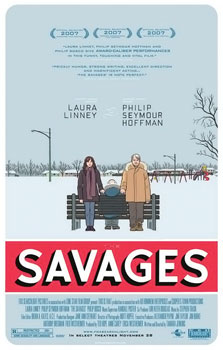Isaac Butler at The Current:
 When Philip Seymour Hoffman starred in Tamara Jenkins’s The Savages (2007), he had little left to prove. After breaking through in the 1990s with a series of scene-stealing performances in films like Boogie Nights, Happiness, The Big Lebowski, and The Talented Mr. Ripley, he had become an in-demand actor’s actor. Thanks to a 2000 Broadway production of True West and his work as co–artistic director of the LAByrinth Theater Company, he also garnered a reputation as one of the best stage actors of his generation. By the time he won the Best Actor Oscar for Capote in 2005, he had become a one-man symbol of quality. When The Savages was released, it was one of three Oscar contenders featuring Hoffman (along with Before the Devil Knows You’re Dead and Charlie Wilson’s War) running in theaters at the same time.
When Philip Seymour Hoffman starred in Tamara Jenkins’s The Savages (2007), he had little left to prove. After breaking through in the 1990s with a series of scene-stealing performances in films like Boogie Nights, Happiness, The Big Lebowski, and The Talented Mr. Ripley, he had become an in-demand actor’s actor. Thanks to a 2000 Broadway production of True West and his work as co–artistic director of the LAByrinth Theater Company, he also garnered a reputation as one of the best stage actors of his generation. By the time he won the Best Actor Oscar for Capote in 2005, he had become a one-man symbol of quality. When The Savages was released, it was one of three Oscar contenders featuring Hoffman (along with Before the Devil Knows You’re Dead and Charlie Wilson’s War) running in theaters at the same time.
He also had only seven years left to live. This is the struggle in writing about Hoffman: stories tend to derive their meanings from their endings, and his was tragic. But he was not a story—he was a man, filled with all the complexity and contradictions that any of us carry with us.
more here.
Enjoying the content on 3QD? Help keep us going by donating now.
